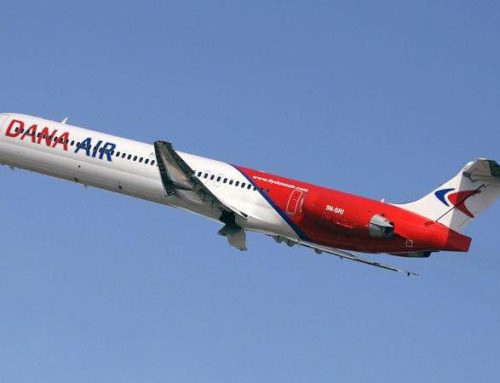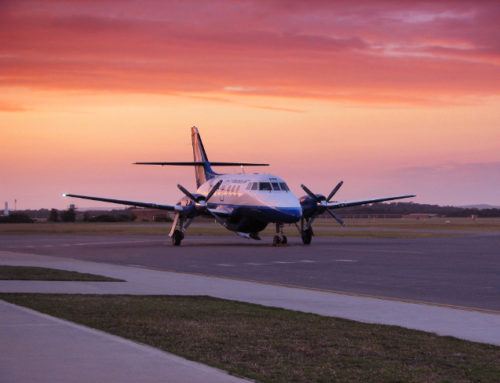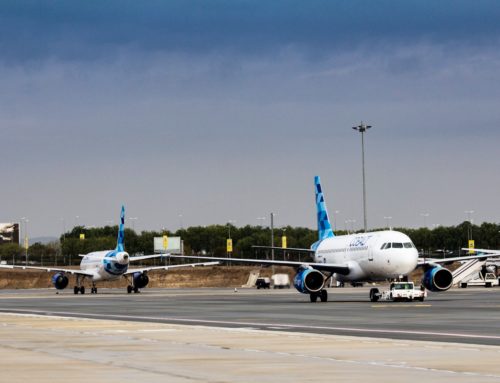Announcing record first half year profits of EUR 4 million at a press conference, Small Planet Airlines announced plans to invest its higher profits in increasing passenger comfort on its fleet of A320-200 aircraft, its largest investment into fleet renewal in the carrier’s history. Small Planet has ordered 3000 new seats from Recaro and will equip its fleet with LED lighting, Economy Premium seats with more leg room and AirFi streaming in-flights entertainment to customer’s devices. With its German subsidiary launching operations in spring 2016, Small Planet plans to operate twenty A320-200 aircraft next summer season across its three airlines in Lithuania, Poland and Germany. Small Planet is also in the process of obtaining an air operator certificate in Thailand.
ch-aviation’s Thomas Jaeger had a chance to sit down with Vytautas Kaikaris, the Chief Executive Officer of Small Planet Airlines, on the terrace of his carrier’s new headquarters in the city center of Lithuania’s capital Vilnius.
Learn about Small Planet on ch-avation:
Small Planet Airlines: Airline Information | Aircraft and Fleet List | Recent News
Small Planet Airlines Polska: Airline Information | Aircraft and Fleet List | Recent News
Small Planet Airlines Germany: Airline Information | Recent News
Small Planet Airlines Thailand: Airline Information | Recent News
So you’re obviously growing very fast. What are the key drivers behind your growth in the European market and what have been the biggest challenges for you personally and for the company?
Our biggest growth has been in Poland which is where we have grown the most. This year, we operated eight aircraft plus a standby unit in Poland and that constitutes about 60% of our total revenue. So why are we growing so fast in Poland? Well I think it’s a combination of a few things. First, it’s still very much a developing market with natural demand which we have satisfied. We also came at the right time when a lot of weaker competitors were going out of business and there were a number of bankruptcies. As such, I think tour operators were very much in the hunt for reliable partners capable of providing good quality service for the long term, and not just a one-off as has happened in a number of cases. So I think we have established good relationships with tour operators whose growth requirements we were able to satisfy. In other markets such as Western Europe, I think our unique selling point against our competitors there is our lower cost structure. Obviously it helps coming from countries like Poland and Lithuania where labor costs are not as high as they are in Western Europe. Overall, this helps us to offer a very low unit cost wherein our CASK is one of the lowest in the industry. The way we are able to achieve that is because our utilization is quite high and it is getting higher because of the Asian ventures we have in the pipeline. Instead of keeping our aircraft parked, we are utilizing it and obviously that helps drive our total unit costs down. This allows us then to offer more competitive pricing and gives tour operators the incentive to choose us over the rest. In fact, if you look at the European charter market, operators from Eastern Europe have been gaining a significant amount of market share. When you combine us, Travel Service and Enter Air’s market share you’ll see we are now among the main charter operators in Europe.
So for you right now, tour operators are your key source of revenue. But you also do ACMI operations in winter. From a revenue perspective, how dependent are you on ACMI revenue and how does it contrast to other Baltic operators such as Avion Express and SmartLynx where it’s the exact opposite of what you’re doing?
We have chosen to pursue a different strategy wherein we are predominantly a full-charter business. This means we have our own call signs and our own customer experience. In summer, 100% of our operations are on a full-charter basis – we do zero ACMI. But ACMI operations, though a small part of our business, are still important to us because they mainly occur during winter – the low season. Last year, I think our Asian ACMI operations made up about 4% of our total revenue. So obviously, there is still a lot of room to grow.
You mentioned Asia before. Again comparing you to Avion Express, which is another Lithuanian operator, why did you chose Asia over the Caribbean like they have done?
We just divided the globe (laughs). No but seriously, I suppose Avion had some connections in the Caribbean and it worked out for them there. We on the other hand, established good relationships with partners in Asia and so for us, we see our future down there. So to answer your question, they looked West, we looked East.
Obviously as you grow your fleet, the winter problem becomes more pronounced. At present, you have a deal with Cambodia’s Sky Angkor for several winter seasons which protects you from competition there. But you have been struggling In Thailand as a result of external factors. When do you hope to be up and running and what is your take on the situation in Thailand given the ICAO’s recent imposition of a Serious Safety Concern against the country?
We knew that setting up in Thailand would be a long process but we didn’t expect it to take this long! As you say, there have been these external factors which have dramatically impacted the situation and prolonged it. As such, in November we expect to get an update on the way forward with the ICAO matter and we hope that everything will be resolved. We hope then that the Thai Department of Civil Aviation (DCA) will begin issuing licenses again. But even if things get going, it’s difficult to tell how long the whole process will take. Usually it takes 6 months to a year but in this case we simply do not know. In the interim, we are also looking at partnering some existing operators as that would be a ‘shortcut’ into the market minus the red tape. However, we also have to be careful whom we partner and under what conditions given that a lot of Thai operators are in a lot of trouble.
In Poland you’re competing with other Eastern European charter operators such as Travel Service and Enter Air. Have you considered other markets in the region or is your main focus to expand into Western Europe where there is less direct competition?
That is exactly right. We are already in a strong position in the Lithuanian and Polish markets and we intend to consolidate if not expand that position, especially in Poland. But with our entry into the German market next year, we will then be present in three of Europe’s Big Four markets – the United Kingdom, Germany, France, and Italy. While we did have a contract in France, that was two years ago and we will consider returning there in the future. But basically, we are busy addressing market needs in areas we already operate in as well as those we intend to enter – Germany in this instance. As for the Central European market like the Czech Republic or Hungary, while we have looked into them, we feel they already have strong players there such as Travel Service, which is a very well established brand. As such, we see no reason to compete with them in their home markets in the same way as we see no reason for them to enter ours. In all, our target market is Western Europe where we intend to compete with existing operators there.
Your next market entry is Germany. Why there and are you not afraid of being used by TUI and Thomas Cook to undercut others?
We were in a similar situation with leading tour operators in Poland but look what we have achieved. So we know what to expect and we don’t see why we shouldn’t be able to repeat the same success in the German market which is vastly bigger. Yes it is dominated by a few strong tour operators there but with our competitive cost structure, the size of the market, our very competent management team, and our partners we see a real opportunity there.
Travel Service recently took on Chinese investment. Are you looking for similar opportunities to provide you with added financing thus allowing you to more rapidly expand?
Obviously we’re looking at all available options. We have looked at going public (IPO) but have yet to decide on anything. Alternatively there is the possibility of taking on-board a private equity investor. But, in all, we have raised sufficient capital from our operations to finance our current growth requirements. Of course, if we decided to venture into the scheduled services market or to acquire aircraft and perhaps even other airlines, we would then definitely require either IPO or private equity funding. But no, no firm plans have yet been made.
Thank you very much!
Learn about Small Planet on ch-avation:
Small Planet Airlines: Airline Information | Aircraft and Fleet List | Recent News
Small Planet Airlines Polska: Airline Information | Aircraft and Fleet List | Recent News
Small Planet Airlines Germany: Airline Information | Recent News
Small Planet Airlines Thailand: Airline Information | Recent News









